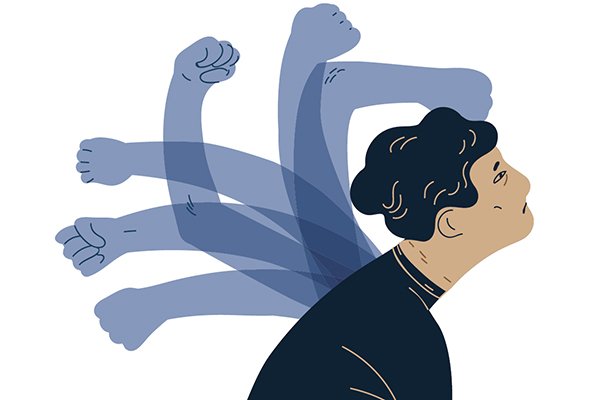Amina, a 32-year-old software engineer, sat in her car outside her office building, paralyzed. “You’re going to mess up this presentation,” the voice in her head sneered. “Everyone will realize you’re a fraud.” Her hands shook as she gripped the steering wheel, contemplating driving away.

|
JUNE 2024
★AFROSPECTIVE

Across town, Ade, a 45-year-old teacher, stared at a blank document. The novel he’d dreamed of writing for years remained unwritten. “Who are you kidding?” his inner critic scoffed. “You’ll never be a real writer.”
These internal bullies, relentless in their assault on our self-esteem, are all too familiar. In an era marked by constant comparison on social media and ever-increasing professional demands, our inner critics have found fertile ground to flourish. But what if we could turn the tables on these mental tormentors?
Enters the concept of “bullying the inner bully”—a provocative approach to managing self-doubt that’s gaining traction among psychologists and self-help gurus alike.
“It’s about reclaiming your mental space,” explains Dr. Elena Rodriguez, a clinical psychologist specializing in cognitive behavioral therapy. “We’re not talking about self-aggression or toxic positivity. It’s about standing up to that internal voice that constantly puts you down.”
The strategy involves four key steps:
| Identify the bully’s tactics For Amina, the inner bully weaponized her imposter syndrome. For Ade, it preyed on his fear of failure. Recognizing these patterns is crucial. “My inner bully always attacks when I’m about to step out of my comfort zone,” says Jamal, a 28-year-old entrepreneur. “Once I realized that, I could prepare for it.” Call out the lies Inner bullies often deal in absolutes and catastrophic thinking. Learning to spot these cognitive distortions is key. When Amina’s inner voice claimed “everyone” would label her a fraud, she paused. “Is that really true?” she asked herself. “Or is this just my anxiety talking?” Challenge the negativity with evidence Ade started keeping a “win journal,” documenting positive feedback he’d received on his writing. When self-doubt struck, he could counter with concrete evidence of his abilities. Cultivate compassionate self-talk “Imagine talking to a friend who’s struggling,” advises Dr. Rodriguez. “You wouldn’t berate them. Apply that same kindness to yourself.” |
“Bullying the inner bully isn’t about eliminating self-doubt entirely,” cautions Dr. Rodriguez. “Some level of self-questioning can be healthy. It’s about not letting that voice control you.”
The results of this approach can be profound. Amina not only delivered her presentation but received a promotion shortly after. Ade completed his first draft and is now working with a literary agent. Jamal’s startup secured its first round of funding.
Critics argue that the confrontational language of “bullying” the inner critic might reinforce negative mental patterns. Proponents counter that it provides an empowering framework for those who feel victimized by their own thoughts.

Lisa, a 50-year-old artist, found this approach transformative. “I started treating myself like I’d treat my best friend,” she says. “It felt weird at first, but it’s become second nature now.”
But for some, simply challenging negative thoughts isn’t enough. Enter a more provocative approach: verbally confronting the inner bully head-on.
“Sometimes, you need to fight fire with fire,” says Dr. Alex Chen, a cognitive psychologist at Stanford University. “By actively confronting and even mocking your inner critic, you can strip away its power.”
This method, while unconventional, has found success among those who feel overwhelmed by traditional cognitive behavioral techniques.
Take the case of Jordan, a 29-year-old marketing executive who struggled with severe driving anxiety. “My inner voice would constantly tell me I couldn’t drive, that I’d crash or freeze up in traffic,” Jordan recounts. “One day, I’d had enough.”
In a moment of frustration and defiance, Jordan challenged the inner bully aloud: “Oh yeah? If you’re so sure I can’t drive, why don’t you take the wheel and prove you can do better?”
The result? Silence.
“All I heard was crickets,” Jordan laughs. “So I sarcastically said, ‘Oh, so you can’t? Such a shame.’ In that instant, I reclaimed my freedom. I fed the inner bully a taste of its own medicine, and it backed down.”
This confrontational approach may seem counterintuitive, especially given the emphasis on self-compassion in many therapeutic models. However, proponents argue that it can be a powerful tool for those who feel bullied by their own minds.
“It’s about reclaiming your agency,” explains Dr. Chen. “By directly challenging and even mocking the inner critic, you’re asserting your control over your thoughts and emotions.”

Critics caution that this method may not be suitable for everyone, particularly those dealing with clinical depression or severe anxiety disorders. As with any mental health strategy, it’s crucial to consult with a professional before adopting new techniques.
As our society grapples with rising rates of anxiety and depression, particularly among younger generations, tools for managing negative self-talk become increasingly vital. While not a substitute for professional mental health care when needed, learning to stand up to our inner bullies may offer a path to greater resilience and self-compassion.
The key, experts say, is finding the right balance. Compassionate self-talk remains important, but for some, adding a dash of defiance to the mix can be the secret ingredient in conquering self-doubt.
As our understanding of cognitive processes evolves, so too do our strategies for managing them. Whether through gentle reassurance or fiery confrontation, the goal remains the same: to quiet the inner bully and amplify our authentic, confident selves.
For Amina, Ade, Jordan, and countless others, it’s been a game-changer. “I still hear that critical voice sometimes,” Amina reflects, “but now I know how to put it in its place. I’m the one in charge of my story.”
For those who’ve found success with these methods, the message to their inner critics is clear: bully at your own risk.










